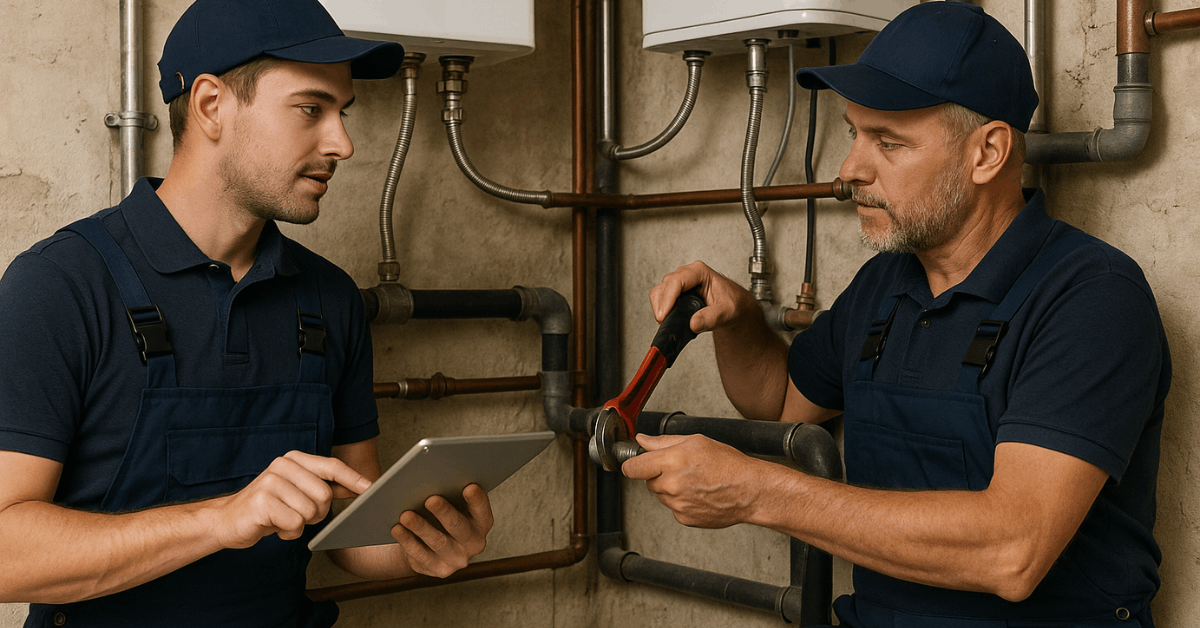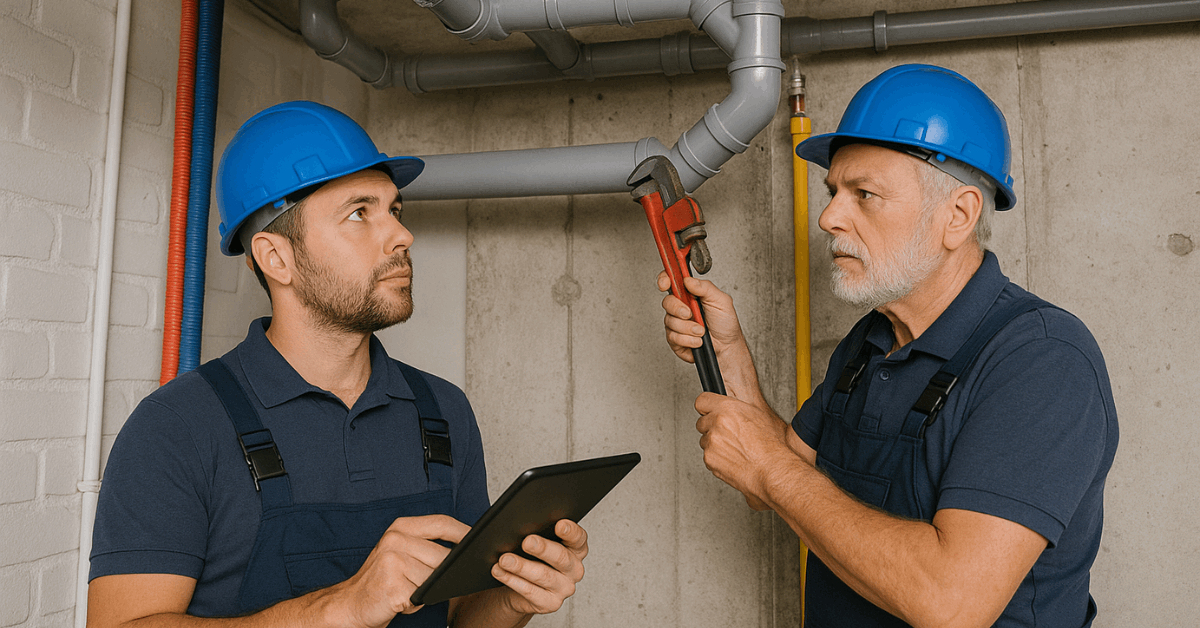Working as a plumber in Europe offers many job opportunities and stability. Knowing how to find plumber jobs in Europe helps you secure a steady income in a high-demand trade.
The growing need for skilled plumbers drives demand across housing and infrastructure projects. This guide gives clear details on job types, salaries, and application steps.
Understanding the Plumbing Profession
Plumbing is an essential trade that supports residential, commercial, and industrial systems. In Europe, plumbers handle water supply, heating, and drainage systems in both new and existing buildings.
You’ll find diverse opportunities, from working on construction sites to maintaining hotel and factory systems. Each role requires technical skill, precision, and attention to safety standards.
Core Responsibilities
A plumber’s main duty is to install, repair, and maintain piping systems. You’ll also test equipment, detect leaks, and ensure compliance with building codes.
Understanding blueprints and using specialized tools are key daily tasks. Good problem-solving and teamwork make you more effective on job sites.

Qualifications and Skills
Most European countries require vocational training or certification before employment. Hands-on apprenticeships are common and can last up to four years.
Knowledge of modern tools, water systems, and basic electrical work gives you an edge. Employers also value soft skills like punctuality and clear communication.
Types of Plumbing Jobs and Their Salaries
Each plumbing role varies by environment, complexity, and pay scale. Below are the most common positions across Europe and what you can expect in terms of responsibilities and salary range.
Residential Plumber
Residential plumbers focus on homes, apartments, and small buildings. They install water lines, faucets, and drainage systems.
Average annual pay ranges between €28,000 €40,000, depending on experience. Customer interaction and service quality strongly influence career growth.
Commercial Plumber
Commercial plumbers handle larger systems for schools, offices, and malls. They work with complex pipe networks and require knowledge of safety regulations.
Salaries range between €35,000 and €50,000 per year, with higher pay for those working in busy cities. Strong technical experience is essential for these roles.
Industrial Plumber
Industrial plumbers manage systems in factories and production plants. The job demands advanced technical knowledge and high-pressure system handling.
The average salary is around €40,000–€55,000 per year. These jobs often come with better benefits and more stable contracts.
Benefits of Working as a Plumber in Europe
Working as a plumber in Europe offers job security, good income, and the potential to settle long-term. It’s a respected career that values skill and precision. Here are the key benefits you can expect as part of this trade.
- High Demand – Construction, renovation, and infrastructure projects constantly need plumbers.
- Competitive Wages – Salaries and overtime pay are better than many entry-level trades.
- Flexibility – You can choose between private companies, government projects, or self-employment.
- Career Mobility – Certifications allow you to work in multiple EU countries.
- Skill Growth – You can expand into eco-plumbing or heating systems for higher pay.
Qualification and Certification Requirements
Getting the right credentials ensures you qualify for European standards. Employers prefer certified plumbers with hands-on experience. You’ll also need to meet local regulations and possibly pass exams.
Education and Training
Most plumbers start with a vocational or technical diploma in plumbing or mechanical systems. Training combines classroom lessons and on-site practice.
Completing an apprenticeship increases employability. Continuous education helps maintain professional licenses.
Licensing and Work Permits
EU citizens can work freely across member states with proper certification. Non-EU workers need a work visa or EU Blue Card.
Each country has specific licensing authorities, such as NVQ Level 2/3 in the UK or Handwerkskammer in Germany. Always verify recognition before applying.
How to Find Plumbing Jobs in Europe?
Job searching in Europe requires preparation and the right strategy. You need to identify reliable job sources and tailor your applications carefully.
Online Job Portals
Start by browsing trusted websites like EURES, LinkedIn Jobs, Glassdoor, and Indeed. You can also check official resources such as the EU Blue Card portal for non-EU workers.
Create an updated profile with your certifications and references. Apply directly and follow up with professional communication.
Recruitment Agencies
Agencies that specialize in trade placements can connect you with top employers. They also help with visa paperwork and interview preparation.
Choose registered agencies that handle skilled labor placements in Europe. Always check reviews and feedback before signing agreements.
Networking and Trade Groups
Joining trade associations improves your visibility and access to hidden job opportunities. Attend trade fairs, workshops, and online plumbing communities.
Networking helps you stay informed about industry updates. Many plumbers find their best contracts through referrals.

Top Countries Hiring Plumbers
European countries differ in labor demand, salary, and certification rules. Here’s where opportunities are most promising today.
Germany
Germany offers some of the best wages for certified plumbers, averaging €40,000 per year. The country faces a skilled labor shortage, making foreign workers highly valued.
Language skills in German increase your hiring chances. Most roles are within residential and infrastructure projects.
United Kingdom
The UK remains a major destination for skilled tradesmen. Plumbers earn around £32,000 per year, with strong demand in London and regional cities.
Certifications like NVQ Level 3 or City & Guilds are preferred. Plumbing businesses also seek subcontractors for housing projects.
Netherlands
The Netherlands prioritizes sustainable and green plumbing systems. Jobs often pay €38,000–€45,000 annually.
English is widely accepted, but learning Dutch is advantageous. Experience in eco-plumbing boosts employability.
Career Growth Opportunities
Plumbing isn’t limited to hands-on repair work. With time, you can move into management, business ownership, or teaching. Advancement depends on experience, specialization, and continued learning.
- Supervisor or Foreman – Lead teams on construction or maintenance sites.
- Business Owner – Run your own plumbing company serving residential or commercial clients.
- Trainer or Instructor – Teach technical skills in trade schools or workshops.
- Eco-Plumbing Specialist – Focus on energy-efficient systems for higher-paying projects.
Continuous training in new technologies and materials can double your income in a few years. Many plumbers also take project management courses to move into leadership roles.
Common Challenges and Solutions
Working abroad as a plumber involves adjustments to regulations and culture. You’ll need to prepare for language, paperwork, and technical differences.
- Language Barriers – Learn basic job-site phrases to communicate effectively.
- Certification Recognition – Ensure your credentials are validated under EU standards.
- Legal Requirements – Understand your visa terms and employer obligations.
- Work Conditions – Be ready for varied climates and building styles across Europe.
Adaptability and professionalism help you succeed in any country. Staying informed about safety standards and new technologies keeps you competitive.
Expert Advice for Job Seekers
Success in plumbing jobs abroad requires strategy and patience. These expert tips can help you build a reliable career foundation.
- Keep your CV updated with your training, projects, and certifications.
- Always check a company’s legitimacy before signing contracts.
- Improve your language skills to increase workplace communication.
- Stay consistent and apply to multiple listings weekly.
- Use online platforms and forums to learn from other professionals.
Persistence and skill improvement make you stand out in a competitive market. Employers value dependability more than years of experience.
Your Path to a Successful Plumbing Career
Finding plumber jobs in Europe begins with preparation, qualifications, and persistence. Skilled plumbers remain vital across European cities where construction and maintenance never stop.
Competitive salaries, steady demand, and career growth make plumbing a solid long-term path. Start by building your credentials and applying with confidence — Europe’s plumbing industry is waiting for your expertise.











